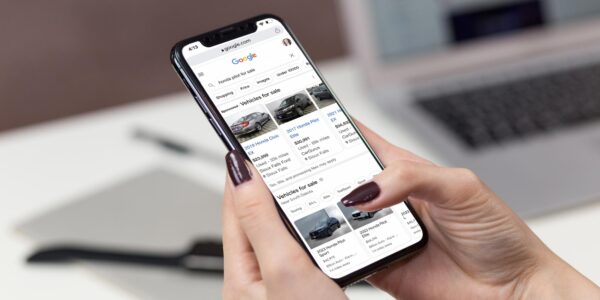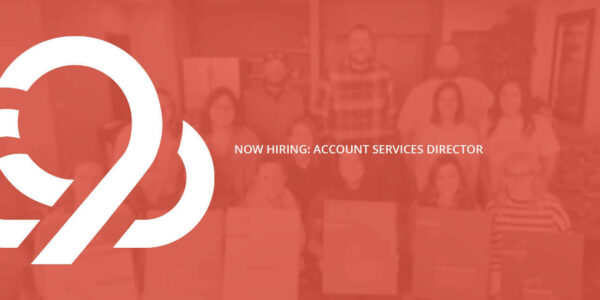
Facebook’s Special Ad Category Shows Little Impact for Auto Dealers
What Facebook advertisers thought was a lion of a change turns out to be a lamb. Despite newly limited targeting options, automotive marketers need not be afraid of Facebook’s Special Ad Category for credit-related ads.
Note: Due to a settlement agreement between Meta and the US Department of Housing and Urban Development in 2022, SAAs are no longer available to use for Facebook targeting.
As we announced in July 2019, Facebook was planning to make significant changes to its targeting tools as part of a settlement stemming from a discrimination lawsuit. These changes prevent advertisers from singling out socioeconomically vulnerable groups of people with ads — including any ads run by auto dealers.
As you can imagine, our team was a bit jarred by the news, but we’ve adapted quickly to help our dealership clients stay on top of these significant changes.
Our team set out to conduct several tests of the new Special Ad Category, pitting it against our conventional targeting standards. We also test-drove the new Special Ad Audience (which is similar to a Lookalike Audience within the Special Ad Category).
Our team completed the first round of split tests in August 2019, and the results were more positive than we had expected. Here are the three main conclusions we’ve made:
1. Dynamic Retargeting Is Largely Unaffected
In multiple tests of our dynamic retargeting ads, Facebook’s Special Ad Category didn’t appear to affect results.
Reach, content views, clicks, and even cost per click (CPC) were all within a very close margin between both sides of these experiments.
In one experiment for a single-point used commercial truck dealership, the Special Ad Category actually seemed to improve performance:
- Conventional: 476 people reached, 167 landing page views, 54¢ per landing page view
- Special Ad Category: 518 people reached, 205 landing page views, 55¢ per landing page view
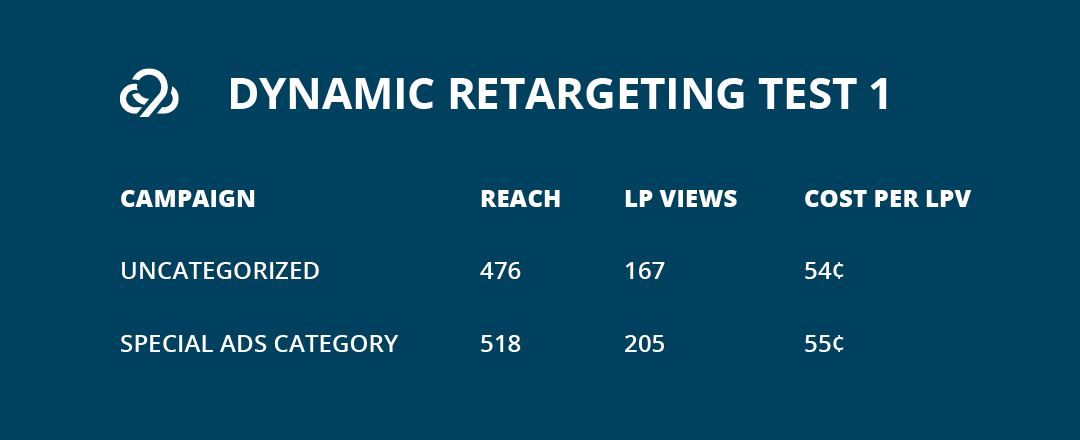
In another dynamic retargeting experiment, a single-point Ford dealership saw no significant change when selecting Facebook’s Special Ad Category:
- Conventional: 1,508 people reached, 831 landing page views, 36¢ per landing page view
- Special Ad Category: 1,515 people reached, 762 landing page views, 39¢ per landing page view
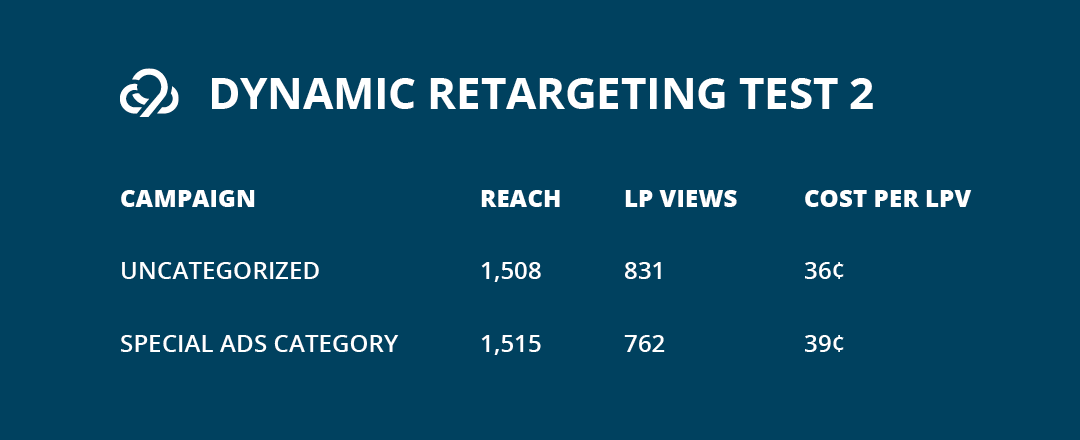
While this data shows a very slight edge for conventional targeting, it’s not statistically significant enough for us to determine a clear winner. In this case, that’s great news!
2. Interests Are Limited, But Performance Isn’t
In addition to these dynamic retargeting experiments, we also conducted split tests on the interest-based targeting offered in the conventional campaigns and in campaigns using the Special Ad Category for credit offers.
The most significant change was the limitation of Facebook’s interests and behaviors within the “Detailed Targeting” section of Ads Manager. While these options have been pared down to more generic categories (e.g. “SUVs” or “Cars” interests instead of “Ford Explorer” or “Chevy Impala” interests), we actually saw almost no reduction in performance when advertising to what our team had thought would be a less relevant audience.
Luckily, we were wrong!
In general, the results from these interest-based tests were very positive. For the same single-point Ford dealer, not only did the volume of page views increase, but the cost was more efficient as well:
- Conventional: 5,496 people reached, 264 landing page views, 57¢ per landing page view
- Special Ad Category: 5,874 people reached, 328 landing page views, 46¢ per landing page view
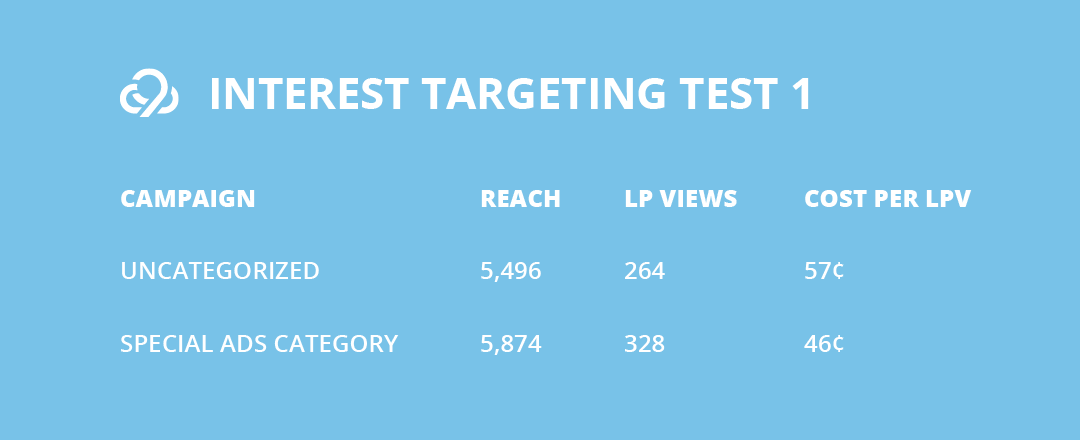
A test involving used vehicles at a single-point CDJR dealer showed similar results. With both the conventional and Special Ad Category campaigns using the “used car” interests within the same geography and for the same ages, the Special Ad Category campaign won out in both volume and cost:
- Conventional: 2,049 people reached, 273 landing page views, 37¢ per landing page view
- Special Ad Category: 2,374 people reached, 316 landing page views, 32¢ per landing page view
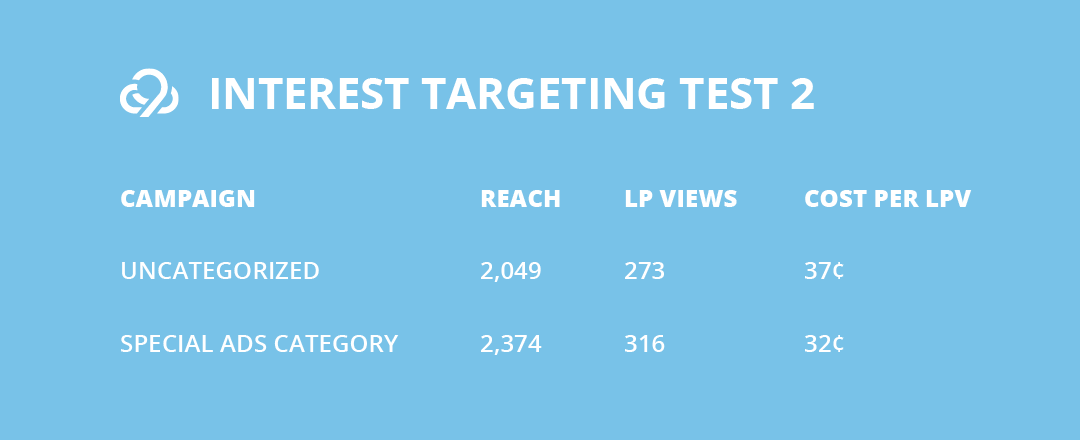
These positive results also reflect in Google Analytics. In the used car campaign for the CDJR dealer, the Special Ad Category resulted in 2.09 pages per session (vs. 1.84 for conventional) and 20% more vehicle description page (VDP) views.
3. The Special Ad Audience Is Legit
Along with these restrictions to interests and behavioral targeting, Facebook introduced what it calls a “Special Ad Audience” in the “Ad Set” settings (which is not to be confused with “Special Ad Category” configured at the campaign level).
Besides the name, these Special Ad Audiences are virtually identical to Lookalike Audiences used in the conventional campaign targeting. In fact, they’re created within the same area of Ads Manager with the same menu.
According to Facebook, the Special Ad Audience is filtered to prevent discrimination, although it hasn’t divulged exactly how that happens.
When we tested a conventional Lookalike Audience against a Special Ad Audience for one RV dealership, we saw very comparable results, although the Lookalike Audience did reach slightly more people in its market:
- Lookalike Audience: 1,977 people reached, 163 landing page views, 16¢ per landing page view
- Special Ad Audience: 1,757 people reached, 171 landing page views, 15¢ per landing page view
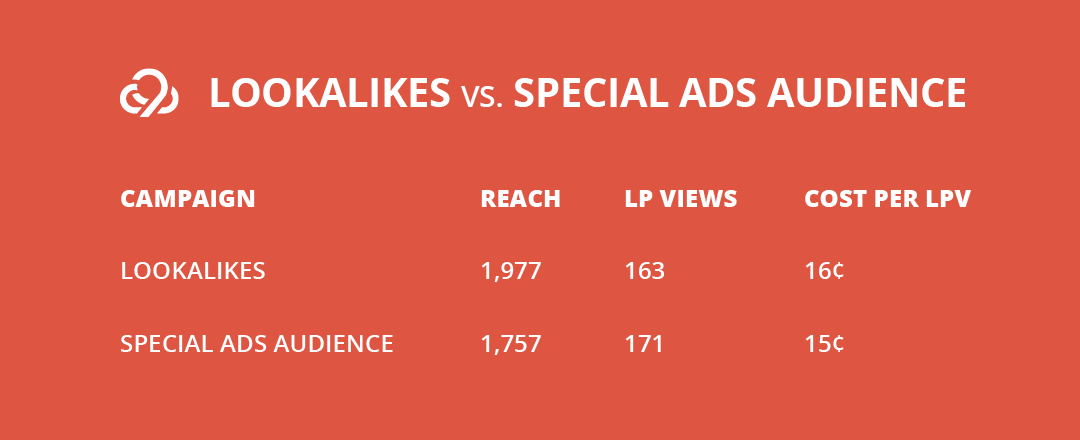
One interesting thing to note here is the overlap of these audiences. The combined reach of the Lookalike Audience and the Special Ad Audience totaled 2,848 people, which implies a 31% overlap (or 886 people) between these two groups.
Why does this matter? While Facebook is actively filtering people out of your Special Ad Audience, it’s also replacing those people to yield a larger reach than the Lookalike Audience.
All the while, the cost per landing page view of each audience ended up within a penny of each other.
While the Special Ad Audience isn’t necessarily blowing Lookalikes out of the water, we’re pleased to see no significant change in performance within the new (mandatory) Special Ad Category.
What Does This Mean for Your Dealership?
Continue with confidence within the Special Ad Category.
Being regulated by Facebook is one of the toughest challenges facing digital marketers today, but our tests have shown that this particular change isn’t necessarily a bad thing.
With all its privacy shenanigans in the press — and with reflexively changing policies on advertisers — Facebook is hard to predict and trust these days.
However, any effort to prevent discrimination (intentional or not) is always a good thing in our book. Now, we happen to have the data to back it up.
Does Your Marketing Team Need Help with Navigating the World of Facebook Advertising?
9 Clouds offers a full library of digital advertising resources for dealership marketers and managers who are looking to make more impact on this ever-growing (and ever-changing) platform.
Get started by downloading our Facebook and Instagram Guide for Auto Dealers.
GET OUR FREE FACEBOOK AD EBOOK »


![Human vs AI A/B Test [Spoiler Alert: Humans Win!]](https://9clouds.com/wp-content/uploads/2024/02/Volvo-dealership-1-600x388.png)
